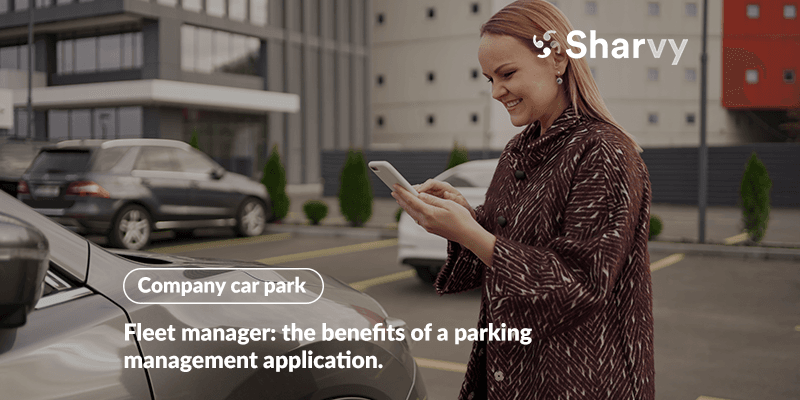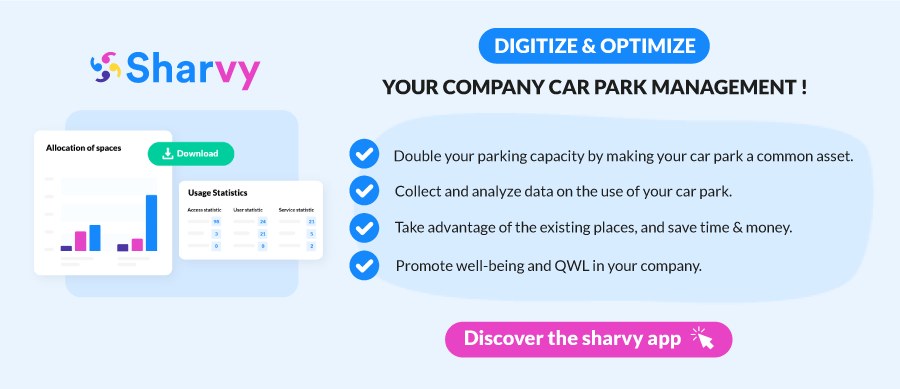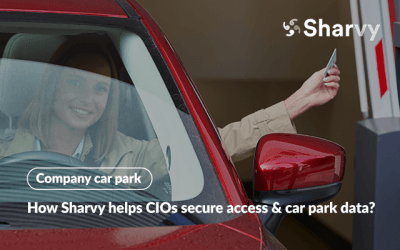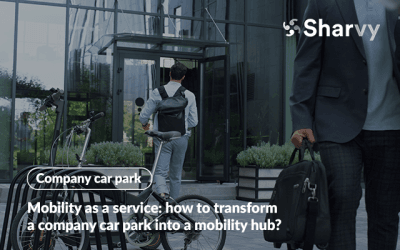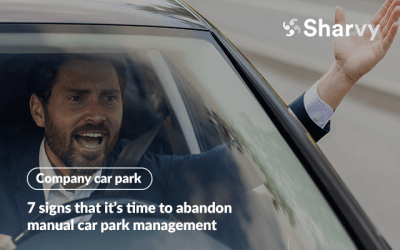You manage a car fleet, juggling a thousand and one constraints on a daily basis: but what about parking? It may seem like a secondary issue, but it can become a source of tension, stalemate and wasted time.
Between saturated car parks, informal reservations, uncontrolled access and a lack of reliable data, managing parking spaces quickly becomes a headache. And when your fleet has to share space with employees, visitors and service providers, the equation becomes even more complicated.
The result? Daily irritations, an avoidable administrative burden, and sometimes a damaged image for your organisation. But solutions do exist. Today, there are simple tools that can help you manage your company car park more smoothly, while adapting to your constraints.
In this article, we show you how a Parking Management application can become a real efficiency booster for your business, and not just another worry to be managed!
The challenges facing fleet managers when it comes to parking.
1. Parking management is often manual and time-consuming.
In many companies, the management of parking spaces is (still) based on traditional, often obsolete methods. Using Excel files, paper tables and relying on email exchanges to allocate and monitor parking spaces takes up a considerable amount of time.
Every change, every new request and every incident requires a manual update, which quickly adds to the workload.
As well as being slow, this process is particularly vulnerable to human error: double bookings, oversights, information not communicated properly & lost, all these little mistakes can cause a great deal of inconvenience within the car park.
As a fleet manager, you find yourself juggling repetitive and tedious administrative tasks, to the detriment of the overall monitoring of your fleet and strategic decisions (which could really make a difference)!
This time-consuming management can also lead to a feeling of frustration, or even powerlessness, when faced with a system that no longer meets today’s needs. What’s more, it’s hard to remain efficient when you spend a large part of your time managing logistical details rather than anticipating, optimising & innovating.
In the end, this manual organisation not only hampers your personal productivity, it also has an impact on the fluidity & overall performance of the fleet.
2. Lack of visibility on parking space occupancy.
Without a dedicated solution, it becomes (almost) impossible to know exactly how many spaces are occupied:
- Which spaces are occupied & available.
- Which spaces are reserved for employees, visitors or service providers.
- Which spaces remain unused on certain days and at certain times.
This constant vagueness forces us to operate blindly, with an approximate organisation that is often based on suppositions rather than concrete facts.
In practical terms, this lack of visibility translates into:
- Permanent uncertainty & blind arbitration: you have to decide between several requests without any data to justify your choices.
- Fragile planning: it’s difficult to anticipate peaks in demand or to allocate spaces according to actual priorities.
- Fixed management: without reliable data, it is virtually impossible to adjust the rules & optimise usage on an ongoing basis.
As a result, you lose control of a strategic lever. This creates not only confusion, but also frustration among employees, who may perceive parking management as unfair and arbitrary.
3. Managing parking between several sites: a real challenge for fleet vehicles!
In large companies and multi-site organisations alike, fleet vehicles don’t stay put. They move from one site to another, depending on logistical requirements, appointments and field missions.
For the vehicle fleet manager, this implies another level of complexity: ensuring that drivers can park easily, whatever the site concerned. A Parking Management application makes it possible to centralise this management: an employee can reserve a space at site X for today, then at site Y tomorrow, with the essential information at hand each time (location, access, badge or remote opening).
The result: more fluidity, less friction, and consistent use of vehicles & and car parks throughout the company.
4. Impact on employee productivity and experience.
Beyond logistics, parking problems have a direct impact on the day-to-day life of your teams. What may seem like a simple operational detail actually becomes a factor influencing the well-being, punctuality and even commitment of your employees.
You may already be aware of this:
- Time wasted looking for a seat every morning.
- Frequent delays, difficult to justify.
- Unnecessary stress on arrival.
- Internal tensions linked to the allocation of places.
- Growing frustration with a system perceived as unfair.
These little annoyances, repeated day after day, end up taking a heavy toll on motivation, efficiency & the working climate. As a fleet manager, ignoring these impacts is tantamount to letting a sticking point silently undermine your company’s overall performance.
What is a Parking Management application and why should you use it?
1. Definition and operation of a corporate parking management application.
A Parking Management application is, quite simply, a SaaS solution that simplifies and automates the management of company parking spaces. Accessible from a computer or smartphone, it lets you manage your entire car park from a single interface.
Ultimately, it works like a dashboard to help you :
- Easily allocate available parkingspaces.
- Make it easy for employees to reserve parking spaces.
- Control access to the car park (ANPR system, access badge, etc).
- Monitor car park occupancy in real time.
- Communicate with users (employees, visitors, service providers).
The aim is simple: to save time, reduce errors, and adapt parking organisation to new ways of working (teleworking, flexible working hours, car-sharing, etc.).
Sharvy is one of the applications that meets these needs. It helps many companies to digitise their car parks, integrating easily with their existing tools and meeting their flexibility requirements.
2. The key features of a Parking Management application.
The richness of a Parking Management application lies in its functionalities, designed to simplify the life of the car fleet manager and users alike. The key features include
- Reservations: planning according to actual needs & fair allocation.
- Real-time management: immediate visibility of company car park occupancy.
- Automatic reallocation: of spaces not used by car park holders.
- Reporting: monitoring of occupancy rates & usage.
- Notifications: personalised reminders & alerts to limit no-shows.
- Mobile access: simple management from a smartphone.
For the fleet manager, it means less manual management and more control over the use of resources. For users, it’s a guarantee of simplified & fair access, with the possibility of adjusting their bookings in real time according to their schedule.
3. Integration with fleet management tools.
However, a good Parking Management application does not work in silo. It integrates with the tools already used by the fleet manager, to ensure consistent, centralised management.
Depending on requirements, the application can interface with:
- Fleet management software (vehicle tracking, maintenance, fuel, etc).
- HR tools (HRIS: planning, absences, teleworking).
- Physical access control systems (badges, barriers).
This integration makes it possible to adapt the allocation of spaces according to specific data (presence, role, type of vehicle, priority, etc.), to automate certain decisions, and to guarantee a complete and reliable overview.
The concrete benefits for a vehicle fleet manager.
1. Optimised use of company car parks.
As a fleet manager, you know how frustrating it is to see parking spaces unoccupied when demand is high. A dedicated application makes a real difference by giving you clear, real-time visibility of the occupancy of your company car park.
This transparency allows you to adjust the allocation of spaces in real time, without wasting time or creating frustration.
For you, it’s a real relief: no more wasted spaces, just a more refined organisation that makes full use of available resources, especially when every square metre counts and budgets are tight. You not only gain in efficiency, but also in peace of mind, because you know that everything is under control.
2. Reduced costs associated with unused & poorly managed parking.
At the same time, company car parks represent a significant item of expenditure. As a car fleet manager, you know that poorly allocated and unused spaces lead to direct costs, whether for the rental of external spaces or the maintenance of unused areas.
Automation and intelligent management via an application can reduce these losses, while cutting the administrative burden. You save time and avoid human error, which translates into significant savings.
3. Improved user satisfaction (employees, visitors).
Clearly, managing your company car park has a direct impact on the experience of those who use it on a daily basis. Allowing your employees to reserve their parking space in advance via an application changes everything. They no longer have to waste time looking for a free space when they arrive, which avoids stress and delays.
For visitors, a well-organised system makes it easier to find a parking space, without confusion or requests for help.
For example, thanks to the Sharvy application, you can send invitations by email to your future visitors, giving all the information they need about parking (date of appointment, contact details of the host, allocated parking space, etc.).
An interactive map (Google Maps) and a map of the car park are also included in the email, so that visitors can easily find their way around an unfamiliar location. Finally, a button to open the car park barrier is activated (if your company has access control via the IoT module) only on the day of the visitor’s reservation, so they won’t even need to ask a third party to open the barrier on the day they arrive.
By facilitating access to the car park in this way, you are not only improving the flow of traffic, you are also helping to provide a positive, professional experience for all users, thereby strengthening your company’s image.
4. Data monitoring for better decision-making.
Another key benefit for the fleet manager lies in the collection & analysis of the data provided by the application. You can accurately monitor the occupancy rate of the company car park, spot peak periods & under-used spaces, and understand user behaviour.
As a result, this factual information helps you make informed decisions about adapting car park capacity, revising allocation rules and planning future investments.
Car fleet manager: how do you choose the right Parking Management application?
1. Consider the technical and ergonomic criteria.
First and foremost, you need to be able to use the tool easily, without extensive training or a complicated interface. The application must be intuitive, clear & accessible from a computer or a smartphone. Here are a few points to check:
- An easy-to-use interface, for both you and your employees.
- A secure connection, for example via an SSO system.
- Rapid deployment, with no complex installation or lengthy lead times.
Bear in mind that if the tool is too technical or rigid, it will quickly be discarded, even if it is well designed.
2. Check that it matches the size & needs of the fleet.
Not all companies have the same constraints. If you manage several sites, a large number of vehicles, or a car park shared by employees and external partners, you need to opt for a flexible solution.
So ask yourself the right questions:
- Can the application manage multi-site car parks?
- Can it automatically allocate spaces according to the rules you define?
- Can it differentiate between user profiles (employee, visitor, service provider, etc.)?
- Can it prioritise certain users according to the criteria you choose?
- Can it keep pace with changes in your usage (teleworking, car-sharing, etc.)?
- Can it work with controlled access (badges, number plate readers, terminals)?
- Can it handle several languages and time zones? Etc.
Finally, ask yourself whether the tool is as agile as your organisation. Because as a fleet manager, you need a system that adapts to your realities, not a fixed solution that complicates your day-to-day work even more.
3. Evaluate the customer support & scalability of the solution.
Even the best technical solution is worthless if you’re on your own when something goes wrong. That’s why customer support and the solution’s ability to evolve are essential criteria.
First of all, ask yourself whether you’ll be well looked after if you need help. Responsive customer support that’s easy to reach (chat, telephone, e-mail) and able to respond quickly to your queries and technical incidents makes all the difference! You shouldn’t have to wait several days to unblock a critical situation.
Next, check whether the publisher offers regular updates, not only to correct any bugs, but also to enhance the solution with new features.
Finally, make sure that the solution can be easily integrated with your existing tools: HR software (to link attendance & seat allocation), access control systems (badges, LAPI system), such as vehicle fleet management platforms. The aim is to avoid double entries, data loss and tools that don’t « » communicate with each other.
In conclusion
Managing a company car park is no longer just about allocating spaces. For a car fleet manager, it’s about organising a shared space, meeting varied needs and adapting to changing usage patterns.
In a context where working patterns are changing, resources are limited and expectations are clear, parking management deserves real attention! Moving from manual to structured management means greater efficiency, clarity and responsiveness.
The question is no longer whether it should change, but how you choose to do it!
Do you have a question? Have a look at the following FAQ!
What is the difference between a classic reservation tool and a Parking Management solution?
A simple reservation tool allows you to block a space on a given date. A Parking Management solution, on the other hand, goes much further: it manages allocation rules, space rotation, interactions between different types of user (employees, visitors, service providers), access rights, and offers a range of data for analysing actual usage.
It’s a management solution (like Sharvy), not just a planning solution.
How can you make management or HR aware of the need for such a tool?
Car fleet managers are often on the front line when it comes to the problems associated with parking: lack of spaces, tedious manual management, tension between users, wasted time, etc. To convince management and HR, they can draw on these day-to-day observations.
However, it is useful to demonstrate that parking management is not just about vehicles and car parks, but touches on broader issues: quality of life at work, operational efficiency, employer appeal, space optimisation, management of internal conflicts.
Using concrete examples (recurrent delays, dissatisfaction, administrative overload), the benefits of such a tool can be better understood. The fleet manager can also demonstrate that these problems have a cost, in terms of time and energy.
What is the role of the fleet manager in implementing a Parking Management solution?
The fleet manager (very often) plays a central role: he or she knows the current uses, constraints, expectations and bottlenecks.
They are therefore the ideal people to talk to about defining needs, defining rules of use, internal communication and monitoring the effectiveness of the system. Ultimately, they become a key player in the company’s mobility policy.
Want to find out more? Check out our latest articles!
How Sharvy helps CIOs secure access & car park data?
Why are access security & corporate car park data a critical issue for CIOs? How can Sharvy help? Focus in this article!
Mobility as a service: how to transform a company car park into a mobility hub?
How can a company car park be transformed into a mobility hub? What role does Mobility as a service play in this evolution?
7 signs that it’s time to abandon manual car park management
Delays, errors and dissatisfaction: identify 7 signs that manual company car park management is reaching its limits.
Subscribe to our newsletter!
PARKING & WORKPLACE MANAGEMENT SOLUTION
Car park management - Charging points monitoring - Desk booking - Booking by time slots
SUBSCRIBE TO THE NEWSLETTER
Receive the latest Parking & Workplace trends by email once a month.

